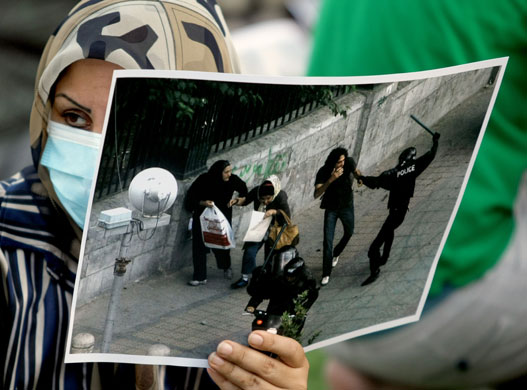
"Dear Israeli Brothers and Sisters," writes Iranian dissident Arash Irandoost, "Iran needs your help more than ever now. And we will be eternally grateful. Please help opposition television and radio stations which are blocked and being jammed by the Islamic Republic (Nokia and Siemens) resume broadcast to Iran. There is a total media blackout and Iranians inside Iran for the most part are not aware of their brave brothers and sisters fighting and losing their lives daily. And the unjust treatment and brutal massacre of the brave Iranians in the hands of the mullah's paid terrorist Hamas and Hizbullah gangs are not seen by the majority of the Iranians. Please help in any way you can to allow these stations resume broadcasting to Iran.
"And, please remember that we will remember, as you have remembered Cyrus the Great's treatment of you in your time of need," Irandoost concludes, signing his blogged call for help "Your Iranian Brothers and Sisters!"
In an interview with Israel National News, Iranian expatriate pro-democracy activist Amil Imani said that Irandoost's message represents the sentiments of much of the youth in the streets in Iran. They have a strong belief in the technological know-how of the Israelis to overcome the Iranian regime's attempts to block communications.
"This is going to be the most massive, impressive revolution of the 21st century," Imani said, "and we're seeing it live." However, he added, it is now too dependent on Internet communications, so the protesters are very much in need of outside assistance to fight the technological and information war.
More generally, Imani said, the Iranian people are lionizing any leader of any nation who comes out strongly against the Islamic Republic at this time.
According to Imani, at least 500 people have been killed by Iranian government forces, with another 5,000 injured.
But the hospitals are no longer safe, he added, as the gunmen from the basiji militia enter the emergency wards looking for wounded protesters. Therefore, Imani said, sympathetic doctors have taken to treating the wounded wherever they can, including in private homes.
Even outside Iran, thousands of protesters are out in the streets every day, especially in the United States. Imani said he thinks the phenomenon represents unprecedented unity in the Iranian expatriate community.
As for the basijis themselves, Imani reported, many of them are Lebanese and Palestinian Authority Arabs hired by the regime to do its bidding. Iranians reportedly captured seven basijis who spoke no Persian, only Arabic. According to Imani, 10,000 more Arab hired guns arrived in Tehran to serve the mullah-led regime.
But they are not the only ones thinking about guns at this point. Some Iranian protesters, Imani reported, have taken to threatening their oppressors, "God help you when we get weapons!"
Even outside Iran, thousands of protesters are out in the streets every day, especially in the United States. Imani said he thinks the phenomenon represents unprecedented unity in the Iranian community, within Iran and abroad.
"There is no turning back," Imani concluded.
Source: Israel National News
H/T: Atlas




















